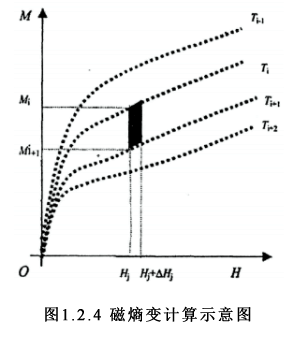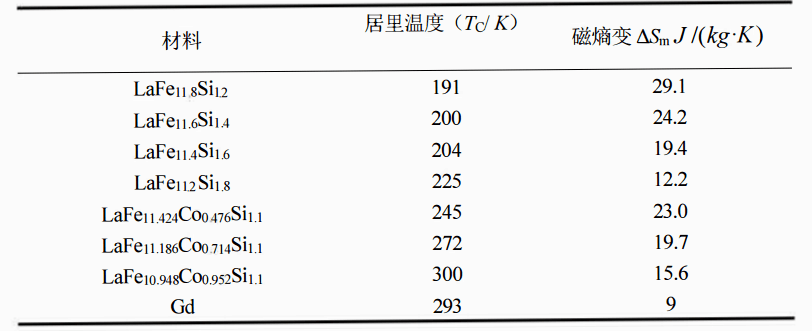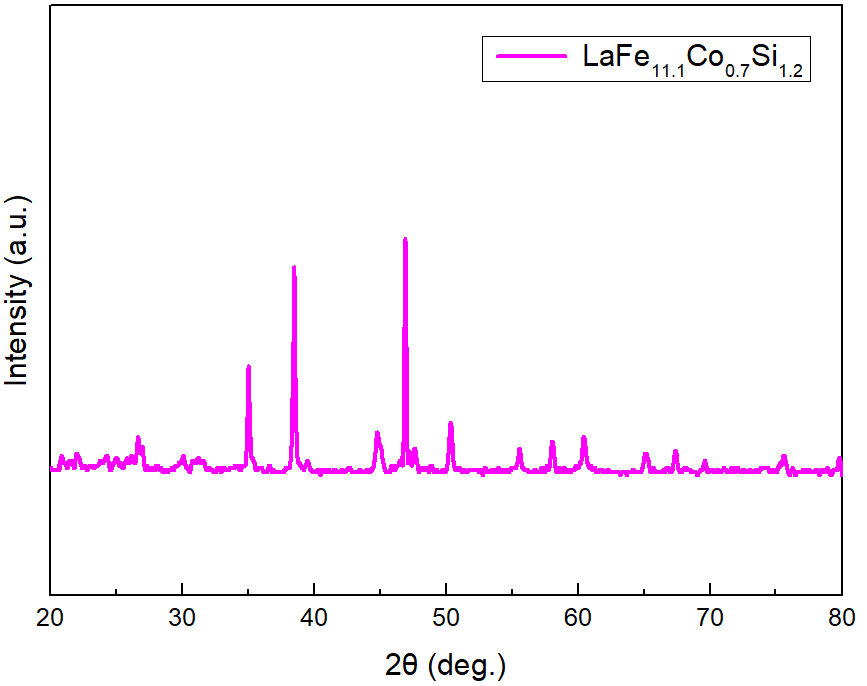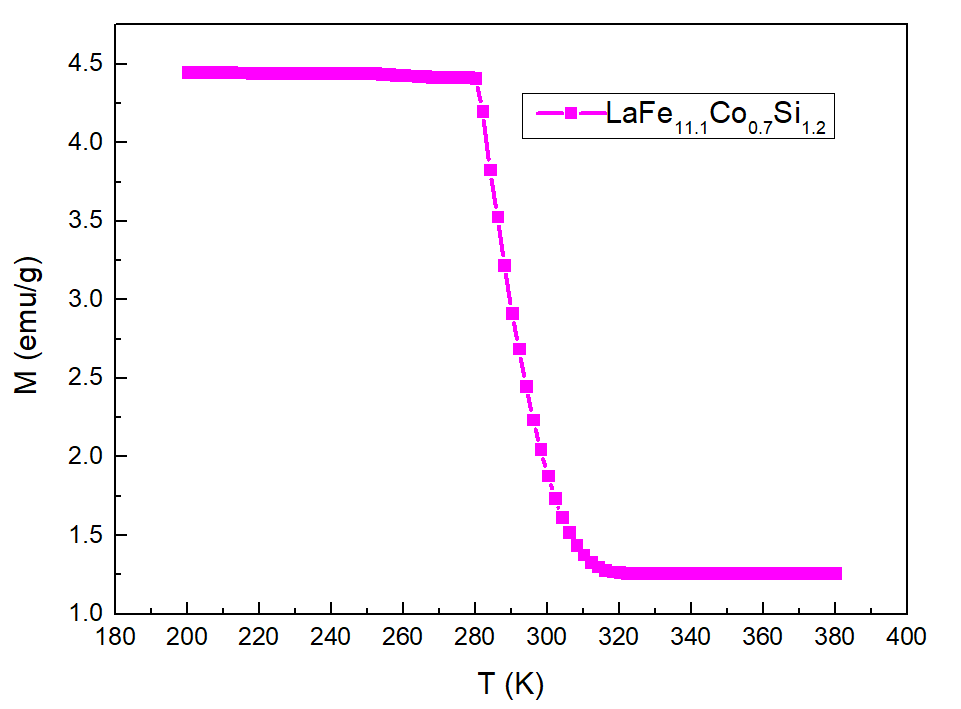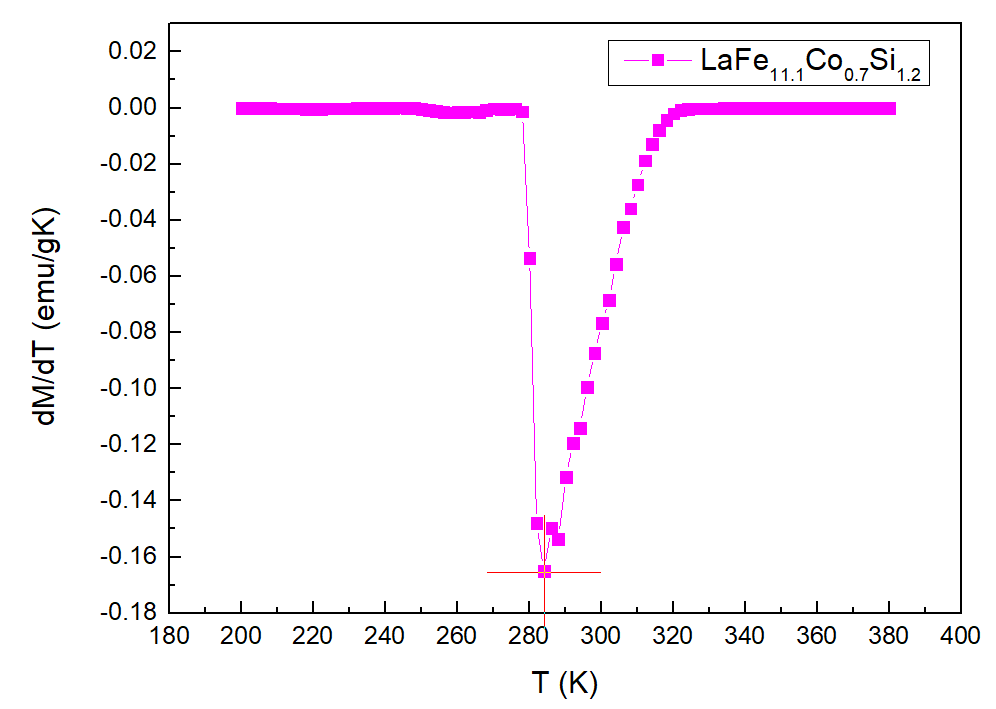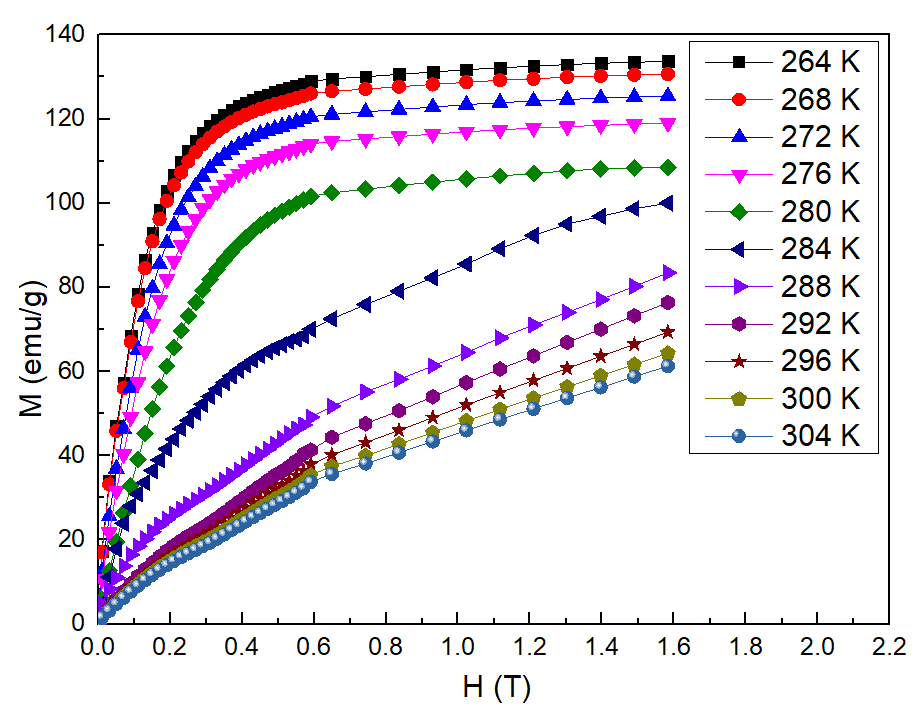基于材料基因工程的磁制冷性能调控研究毕业论文
2020-07-11 18:09:27
摘 要
近年来,高能效、环保绿色、可循环利用的的室温磁制冷技术得到了广泛的运用,因此,研究新型的适用于室温区的磁制冷材料具有很深远的意义。本文从实际运用出发,基于材料基因工程,并以磁制冷技术为基础理论框架,对在室温区中拥有巨大磁熵变的新型磁制冷材料LaFe11.1Co0.7Si1.2 的性能进行调控研究。
磁制冷技术是一种新型的制冷技术,它是以磁性材料作为磁工质,通过磁热效应(MCE)进行制冷的,磁热效应——即磁制冷工质在外加磁场的作用下,分别在等温磁化和绝热退磁时与外界发生热量变化的过程,而吸收热量的过程可以用来进行磁制冷。
本文利用真空电弧炉熔炼技术,成功合成了相关样品,在1050℃ 的热处理条件下退火20天制备了主相为立方NaZn13型相的化合物LaFe11.1Co0.7Si1.2 ,Tc为264K至304K可调,Co掺杂为x=0.7。并且,通过X射线衍射(XRD)对LaFe11.1Co0.7Si1.2合金的结构组成及微观结构进行了测量表征。然后使用振动样品磁强仪(VSM)测量了LaFe11.1Co0.7Si1.2 合金的磁性相变及性能。然后通过计算得出LaFe11.1Co0.7Si1.2合金的居里温度Tc和等温磁熵变图像。最后又根据材料在不同外加磁场下的巨磁熵变ΔSM,继续计算得到材料的有效制冷能力(RCP),根据这些结果得出了磁制冷性能调控结论:
LaFe11.1Co0.7Si1.2 合金在室温区外加磁场的环境下产生了巨大磁熵变,其等温磁熵变峰值ΔSM位于居里温度Tc=284K处,在经过不同外加磁场(0-1.6T)下测试得到,在1.6T时有巨大磁熵变ΔSM=7.28 J/kg·K,其RCP为107.21 J·Kg-1。反映出LaFe11.1Co0.7Si1.2 合金在室温区拥有巨磁卡效应,在居里温度附近存在巨大磁熵变,经过分析,制冷材料产生巨大磁熵变的原因是在Tc =284K 处,稀土磁制冷材料LaFe11.1Co0.7Si1.2 合金中强烈的磁弹性耦合导致其出现了巨大的负膨胀。这说明了LaFe11.1Co0.7Si1.2 合金的制冷效率和制冷能力都较高,符合材料基影工程的要求,是一种新型环保高效的磁制冷材料。
关键词:LaFe11.1Co0.7Si1.2 合金 材料基因工程 磁热效应 磁制冷 磁熵变
Research on the regulation of magnetic refrigeration performance based on material genetic engineering.
Abstract
In recent years, energy efficient, green environmental protection, recyclable room temperature magnetic refrigeration technology has been widely used, therefore, to study new suitable for in the room temperature magnetic refrigeration material has the very profound significance. This article embarks from the practical application, based on genetic engineering material, theoretical framework and on the basis of magnetic refrigeration technology, in room temperature area has a large magnetic entropy change of new magnetic refrigeration materials LaFe11.1Co0.7Si1.2 to adjust and control the performance of the research.
Magnetic refrigeration technology is a new type of refrigeration technology, it was based on the magnetic materials as magnetic medium, through the magnetocaloric effect (MCE) for refrigeration, magnetocaloric effect - the magnetic refrigeration and under the action of magnetic field, respectively in isothermal and adiabatic demagnetization magnetization process of heat changes with the outside world, and the process of absorbing heat can be used for magnetic refrigeration.
In this paper, using the vacuum arc furnace smelting technology, successfully synthesized relevant samples, 20 days in 1050 ℃ annealing heat treatment conditions were the main phase of cubic NaZn13 forms compounds LaFe11.1Co0.7Si1.2, Tc is 264k to 264k is adjustable, Co doping is x=0.7. Moreover, the structure and microstructure of LaFe11.1Co0.7Si1.2 alloy were measured by X ray diffraction (XRD). Then the magnetic phase change and properties of LaFe11.1Co0.7Si1.2 alloy were measured using the vibration sample magnetometer (VSM). Then the Curie temperature Tc and isothermal magnetic entropy change images of LaFe11.1Co0.7Si1.2 alloy were calculated. Then according to the material under the different applied magnetic field of the giant magnetic entropy change ΔSM, continue to calculate the material the effective refrigeration capacity (RCP), the performance of magnetic refrigeration control conclusions based on these results:
LaFe11.1 Co0.7 Si1.2 alloy at room temperature zone and the environment has a large magnetic entropy change of the magnetic field, the magnetic entropy variation isothermal peak Δ SM is located at Curie temperature Tc = 284 K, after under the different applied magnetic field (0-1.6 T) test, T have a large magnetic entropy change ΔSM in 1.6 = 7.28 J/kg · K, the RCP 107.21 J · kg -1. Reflect LaFe11.1 Co0.7 Si1.2 alloy at room temperature with giant magnetic card effect, there is a huge magnetic entropy change near the Curie temperature, after analysis of refrigeration material causes of large magnetic entropy change is in the Tc=284 k, LaFe11.1 Co0.7 Si1.2 alloy in strong magnetoelastic coupling leads to the a huge negative inflation. This indicates that LaFe11.1Co0.7Si1.2 alloy has high refrigeration efficiency and refrigeration capacity, which is in line with the requirements of material substrate engineering and is a new type of magnetic refrigeration material with high environmental protection and efficiency.
Key Words:LaFe11.1Co0.7Si1.2 alloy;Material genetic engineering;Magnetic heat effect;Magnetic refrigeration;Magnetic entropy change.
目 录
摘 要 I
Abstract II
第一章 绪论 1
1.1 材料基因工程 1
1.1.1 材料基因工程的背景 1
1.1.2 材料基因组计划的发展现状与趋势 1
1.1.3 材料基因工程的科学问题与关键技术 2
1.2 磁制冷原理 2
1.2.1 磁热效应的原理 2
1.2.2 磁热效应热力学原理 3
1.2.3 磁制冷的循环方式 4
1.2.4 磁热效应的参数测量 5
1.3 磁制冷材料 7
1.3.1 磁制冷材料的选择 7
1.3.2 LaFeCoSi型磁制冷材料 8
1.4 选题的背景意义及实际应用的发展 9
第二章 实验内容与方法 11
2.1 实验内容与实验过程 11
2.2 实验设备与实验方法 12
2.2.1 原料的制备 12
2.2.2 X射线衍射仪(XRD) 12
2.2.3 振动样品磁强计(VSM) 12
第三章 LaFe11.1Co0.7Si1.2的磁制冷性能调控研究 14
3.1 XRD分析材料结构表征 14
3.2 LaFe11.1Co0.7Si1.2的磁性相变 14
3.2.1 热磁曲线M-T和居里温度Tc的分析 14
3.3 LaFe11.1Co0.7Si1.2的磁热性能 16
3.3.1 等温磁化曲线M-H的分析 16
3.3.2 LaFe11.1Co0.7Si1.2的等温磁熵变 17
3.4 LaFe11.1Co0.7Si1.2的有效制冷能力RCP 18
第四章 结论 22
相关图片展示:

